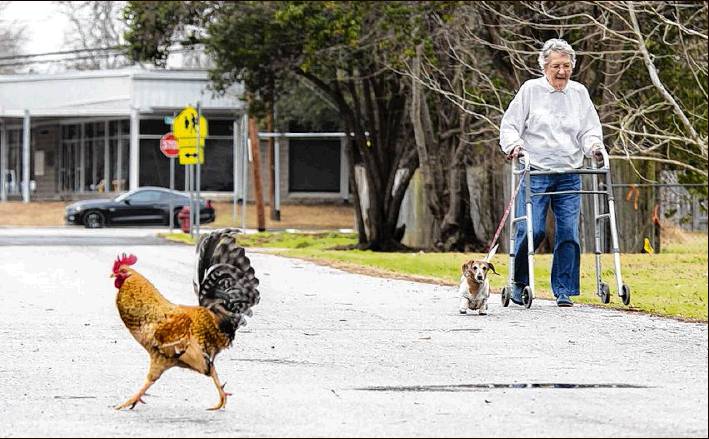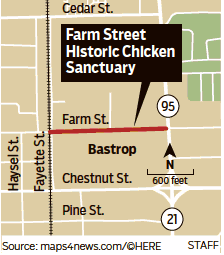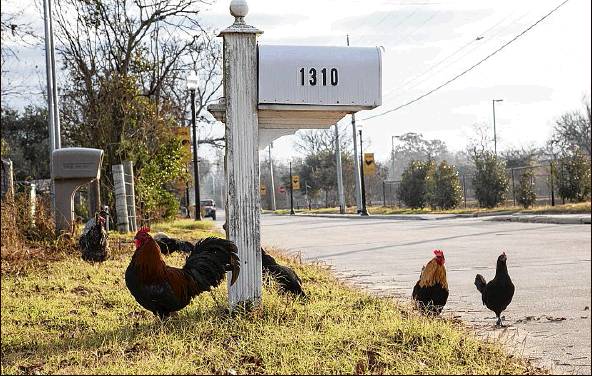BASTROP
Bastrop aims to trap wayward chickens
Birds have strutted too far from the Farm Street Historic Chicken Sanctuary.
By Brandon Mulder bmulder@acnnewspapers.com
BASTROP — The Capital of Texas Zoo counts hippos, peacocks, panthers, tigers and camels as residents at its facility in western Bastrop County. And soon it might be welcoming into its fold many of the free-ranging Farm Street chickens, whose constant clucking, cawing and feculence have driven many Bastrop residents to their wits’ end.
The city’s animal services division is putting final touches on a contract that would hire outside help to trap and rehome many of the fowl that have strutted too far from the Farm Street Historic Chicken Sanctuary, a 1,500-foot stretch of road where the chickens have enjoyed legal protection for nearly a decade.
But the flock’s overpopulation — the city estimates their numbers have grown to between 100 and 200 birds, mostly gamy wild junglefowl — has sent many of the birds scavenging and roosting well outside the sanctuary’s boundaries, between the train tracks near Fayette Street to Texas 95.
“Technically, if they’re outside the train tracks, they’re outside the sanctuary — they’re fair game,” said Troy Walters, the city’s lone animal protection officer.
Walters had originally connected with the Capital of Texas Zoo during the 2011 Bastrop Complex Fire as numbers of homeless domestic and nondomestic animals quickly outmatched the county’s animal shelter’s capacity. By then, Michael Hicks had been running his zoo for more than 15 years and offered to house the more exotic creatures that the fires displaced.
So when Hicks got word that Walters was grappling with chicken overpopulation, he reached out. He’s got a tall perimeter fence around his zoo’s 28 acres, he said, “so coyotes and predators can’t get in. So the only thing that can get them is a raccoon, and we try hard to keep the raccoons out, but we are a rural zoo.”
The straying Farm Street chickens, or however many of them the city is able to round up, would join Hick’s collection of 500 animals, which already include several different species of such birds as peacocks, guinea fowl, geese, a parrot and a small bevy of chickens.
For now, the city is still making preparations before setting out the traps. Staffers have been collecting property releases from homeowners to allow them to set traps in residents’ backyards; they’re ensuring the contracted trapper will have liability insurance; and they’re making several specially made weight-trigger traps.
Once these arrangements have been made, within the next few weeks, Walters said they’ll set up to 10 traps at a time beginning with the fowls who are roosting farthest from the sanctuary, namely near the Farm Street and Pecan Street intersection.
“There’s not a playbook. I don’t know if we’re going to trap at one location for one day, two days or seven days and then move it,” Walters said. “There’s going to be plenty of fish to catch.”
“I have a strong sneaking suspicion we’re going to catch quite a few of them at once,” he said.
The city also has homes lined up other than the zoo — rural homesteads open to taking in fowl outside the city limits, where they can maintain their free-range lifestyle. Any other people interested in taking some of the trapped chickens will be vetted by the city to prevent any of the roosters from falling into the hands of cock-fighters.
“We’re not going to let people come forward and say, ‘I only want the roosters,’ that’s a red flag,” Walters said.
The city began hatching its chicken-trapping plans after the Bastrop City Council held a town hall meeting on the matter in November. For hours, council members and city staff heard from dozens of residents, many frustrated with the roosters’ indiscriminate crowing and torn-up landscaping and who pushed for changes to the city’s sanctuary ordinance.
Other residents, like Jane Campos, who’s lived along Farm Street for 57 years, were quick to emphasize the flock’s charm and reminded the council of their long history in Bastrop. Many say the fowls’ ancestry dates back to the 1800s.
“They have a very large economic impact to the city that is positive,” Campos said. “It’s bringing people to Bastrop. We see them every day, asking where the chickens are and when they can see them.”
The Farm Street Historic Chicken Sanctuary was created after many Farm Street residents demanded that the city protect the fowl. The Bastrop City Council passed the “chicken ordinance” resolution in 2009, which designated the sanctuary and the fowls’ protected, free-ranging status.
City code categorized the Farm Street fowl in the ordinance as “chickens that are not owned by an individual and that generally run at large in the vicinity of the” sanctuary.
Without any natural predators, other than the occasional car that revs down the street, their numbers have blossomed and their territory has grown. Correspondingly, some residents’ perception of them has shifted from charming to aggravating.
“Let me tell you what life is like in our home,” Jennifer Leisure, who’s been living in the neighborhood for over 20 years, said at the town hall. “Roosters — lots of them, six to eight of them — crow at 5 a.m., 7 a.m., midmorning, 2 in the afternoon, and into the evening. It is extremely loud. There are roosters and chickens by my front porch, and they have made a mess of all my flowers and landscaping. Furthermore, chicken poop is everywhere. The excessive noise level and it’s impossible to sit on my front porch.”
Walters is expecting to trap about 20 birds in the coming months, and he’ll play it by ear. If complaints don’t subside, he’ll go back out and deploy more traps, he said.
“We just basically have to make a good judgment on it,” he said.
Contact Brandon Mulder at 512-321-2557.
Watch a video about the chickens with this story on mystatesman. com.


